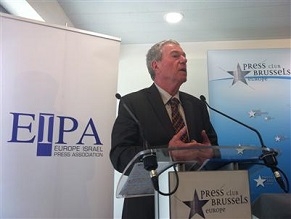|
World Jewish News

Israel's ambassador to the European Union, David Walzer, speaks during the press briefing of the Europe Israel Press Association (EIPA) in Brussels.
|
Israel's envoy to the EU: ‘Our European friends are focusing on settlements instead of considering how they can be more ins
06.06.2013, Israel and the World Israel’s Ambassador to the EU David Walzer delivered a ringing indictment of Europe’s preoccupation with Israeli settlements Wednesday, as he insisted the EU “could be much more influential, much more important in the peace process if they chose to look at other issues as well and not focus their attention” on settlements.
Paraphrasing Israeli President Shimon Peres’ analysis of the significance of the settlement issue in overall peace negotiations between Israel and the Palestinians, Walzer told attendees of the Europe-Israel Press Association’s inaugural press briefing in Brussels that ongoing wrangling in the Middle East conflict was more about history than the terms of a future agreement between the two sides.
“Roughly 75% of people you describe as settlers live on less than 5% of territory held by Israel in the West Bank. If you think of 5 or 6% land swaps between Israel and the Palestinians – Israel is ready,” he continued, as he highlighted Israel’s proven record of doing so as part of its 1979 agreement with Egypt, which saw them destroy settlements in Sinai, and 2005’s unilateral withdrawal from the Gaza Strip, which paved the way for internationally-designated terrorist group Hamas seizing power from their Fatah rivals in the Strip.
Disputing the conclusions of a series of critical statements from the EU and its member states accusing Israel's settlement expansion in the West Bank and East Jerusalem of constituting "an obstacle to peace," Walzer argued that the Palestinians’ preoccupation with retaining the right to return was a more pressing concern.
“The right of return contradicts the idea of the end of the conflict. The right of return means that I as a Palestinian can return to live in Tel Aviv, Haifa or another place – I don’t settle for 1967 borders. I’ll go to the borders which existed before 1947,” he extrapolated, as he characterised Palestinian Authority President Mahmoud Abbas’ seeming reluctance to re-enter into direct peace talks with the Israelis.
“If you put your signature on a paper which says we the Palestinians hereby declare that we have no more demands and this is the end of the conflict, this means also the end of a historical situation, the right of return. Because this means the Palestinians will have to settle for a Palestinian state, there will not be a return of Palestinians to Haifa, to Tel Aviv, to Nazareth to Be’er Sheva, to other places in Israel. This is over. And Abu Mazen (Abbas) refuses to go down in history as the Palestinian leader who put a seal on the conflict between Israel and the Palestinians,” he insisted.
Abbas, he argued, had clearly signalled to the international community and to Israel alike that the peace process is not his foremost priority for the moment, by invoking preconditions on the terms of the agreement that minht be reached by such discussions.
“There’s no point having discussion s if I have to give you the maps of my withdrawal before we even start negotiating the peace process,” concluded Walzer, as he cast doubt on the likelihood of an EU-desired intra-Palestinian reconciliation being realised between Abbas’ PA and Hamas.
Pinpointing the shift of focus of fellow Arab states to Hamas, in light of the Emir of Qatar’s visit to the Gaza Strip last November and Turkish Premier Tayyip Erdogan’s long-awaited visit later this month,a as well as the overthrowing of Abbas’ greatest ally in the region, former Egyptian leader Hosni Mubarak, to be replaced by the Hamas-aligned Muslim Brotherhood movement, he insisted Abbas stood as a lone figure in the region with his authority as Palestinian leader severely compromised by his hostile Arab neighbours.
Reflecting on Israel’s attitude to the peace process, he stressed that any peace agreement achieved between Israel and the Palestinians would be near unenforceable with regards to other Arab countries in the region. Characterising Israeli Premier Benjamin Netanyahu’s moral quandary, he said: “Even if I strike a deal tomorrow with the Palestinians, Syria’s not going to listen. Even if I go back to 4th June 1967 (the date of the infamous Six Day War) and I give back the whole West Bank and Golan Heights and I divide Jerusalem, i still don’t see Syria making peace with Israel, I don’t see Lebanon with the influence of Hezbollah making peace with Israel, I don’t see shi’ite Iraq signing a peace agreement with Israel, so where’s that complete and comprehensive peace taking us? I doubt very much that it’s possible.”
Rejecting the allegation that Israel prioritises its security concerns over any potential peace agreement, the ambassador insisted that “a peace agreement is part of national security”, as he stressed the two shared equal footing in Israel’s assessment.
Conceding that a peace agreement was “very important”, however, he nevertheless asserted that “a peace agreement which will include paragraphs our conditions which will prevent us from being able to defend ourselves is not feasible and is a huge mistake”. Peace agreements, he continued, counted for very little in such a volatile region in the Middle East, when you regard its history and the current conflict in Syria as an example, concluding: “This is a tough neighbourhood, (and) in order to have peace, you have to maintain security.”
EJP
|
|
